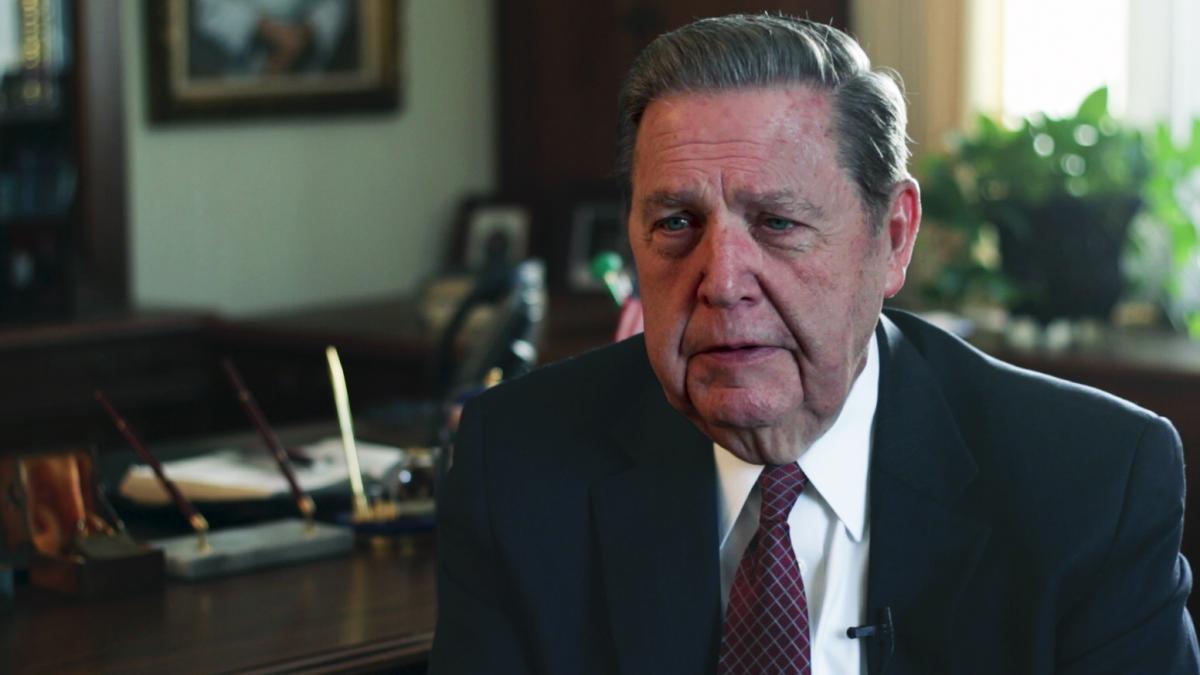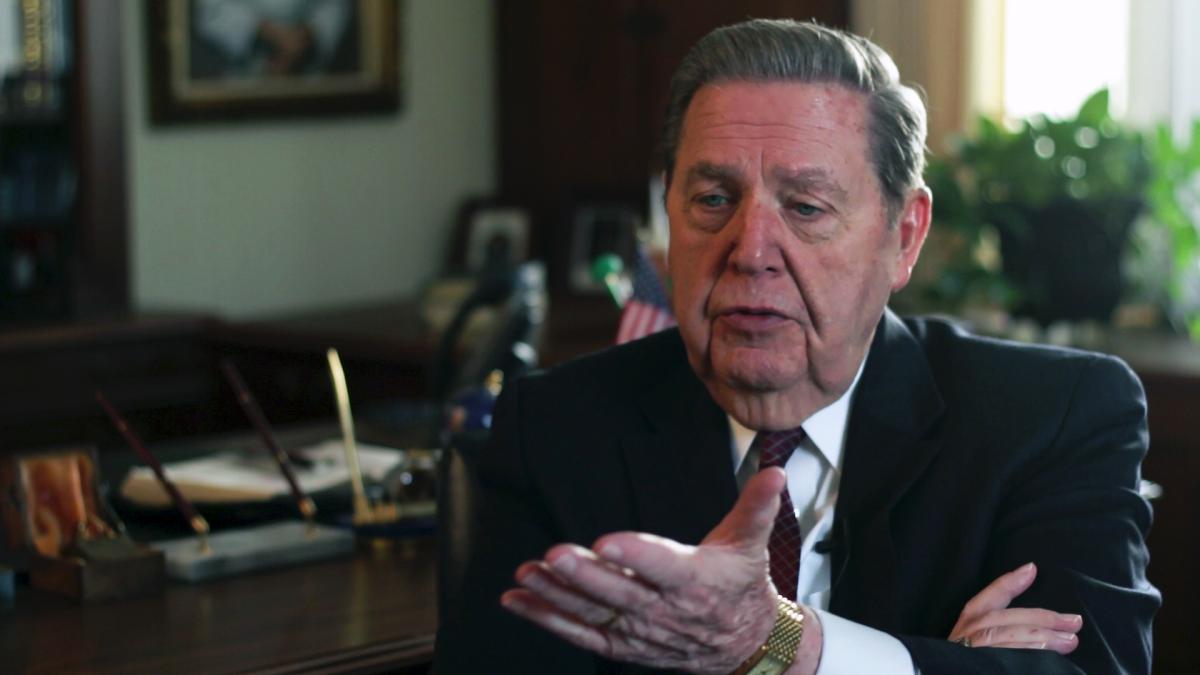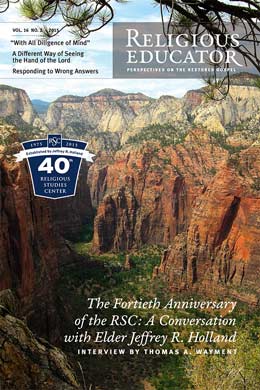The RSC Turns Forty: A Conversation with Elder Jeffrey R. Holland
Jeffrey R. Holland and Thomas A. Wayment
Thomas Wayment, "The RSC Turns Forty: A Conversation with Elder Jeffrey R. Holland," Religious Educator 16, no. 2 (2015): 1–7.
Elder Jeffrey R. Holland is a member of the Quorum of the Twelve Apostles who founded the Religious Studies Center in 1975 while serving as dean of Religious Education at BYU.
Thomas A. Wayment (thomas_wayment@byu.edu) is publications director of the Religious Studies Center.
Wayment: Elder Holland, would you start by sharing with us your original vision for the Religious Studies Center and what you had intended?
Elder Holland: When I was appointed the new dean of Religious Education, one of the first impressions I had was that there were a lot of very valuable things going on—bright, wonderful faculty members, a lot of interest from students, all the zeal and excitement surrounding religion and religious education on this campus—but it struck me that this was a hodgepodge of things when it came to our “college.” I thought, “We need a way to organize here.” There were institutes, journals, a chair, and a couple of research study groups. It just seemed to make sense to create a place for these groups to come together. I hoped that we could cluster those entities, give them a little better administration, maybe avoid some duplication, reinforce what needed to be reinforced, get them more resources. But even more important than that, I thought, was the need to have some sort of place, some sort of sponsorship—a center, if you will—where our faculty could publish.
I am not one of these who say that you are either a teacher or a scholar. We are both of those when we are at universities—you learn in order to teach, and you teach in order to learn. Through all of that there is regular need to write something, to publish one’s best thinking. But we did not have a lot of opportunities to publish LDS-oriented scholarship. We needed a place—a center, if you wish—for our faculty to write and share their teaching with an ever-widening audience of students, alumni, and Latter-day Saints generally. So we combined those two elements: an organizational principle, a home for several existing entities, and a place to write and publish good, orthodox studies that would matter to us in Religious Education at BYU. I took that idea to then-President Dallin H. Oaks. He embraced it instantly, and the next thing I knew it was to the board of trustees and we had a Religious Studies Center. I think it has been a good thing to have done.
Wayment: Can you reflect on one of the things you said there and something that’s interesting to us? We were speaking to Latter-day Saints—that was part of our original intent—and we’ve grown a bit to speak to the external audience.
Elder Holland: No question that our initial view was too modest, too narrow. I see us writing to a wider world more and more in the years ahead as we come out of obscurity and out of darkness. I think now as a church we are poking our head out of obscurity and out of darkness now. Certainly we will always write to Latter-day Saints. But clearly, as young scholars like yourself and others come with the ability to write equally well to the Latter-day Saints and those not of our faith. We will see more of both kinds of writing. We are getting the faculty that can do that.
Wayment: We are, certainly. One of the things that might be exciting too is that so many universities now have courses on Mormonism, courses about Mormons and our history, and what’s exciting is that people are reaching out to us at the center and asking, “What resources do you have? What things are available?”
Elder Holland: I think the RSC is an obvious place for other scholars to turn. I don’t know that it would be that easy for an outsider to know with whom to communicate on such matters. I think it is great to have a Religious Studies Center to which inquiring outsiders can be directed. However, you have to have something to offer, a corpus of information to share, if the larger academic community is going to communicate with you and expect information.
 "I would like this to become known as the scholarly voice of The Church of Jesus Christ of Latter-day Saints."
"I would like this to become known as the scholarly voice of The Church of Jesus Christ of Latter-day Saints."
Wayment: Great. Another thing, when we started, you mentioned this kind of a hodgepodge, and now we’re publishing about ten to fifteen books per year and three journals. I wonder how that strikes you.
Elder Holland: It strikes me very favorably. What I am anxious about, however, is that we not get too broad. I don’t want us to be a mile wide and an inch deep with too many kinds of publications. But I am thrilled with the products I see; I get a copy of most things that are published. I am very proud of that, and like it all very much. But I think we will want to keep asking hard questions: how much is practical, how much is needed, how many lines of communication do we need, and what books are good enough to carry our imprimatur. When we know which products those are, then we should do a world-class job with them. I would like this to become known as the scholarly voice of The Church of Jesus Christ of Latter-day Saints on matters that would normally be considered as “religious studies.” When people think, “Where do I look to see the real heartbeat of intellectual life and academic contribution for The Church of Jesus Christ of Latter-day Saints,” I want them to think BYU, and at BYU, when the issue is religious scholarship, I want them to think of the Religious Studies Center. There is room for lots of other publications too; we have BYU Studies Quarterly, which is a great journal, but it is serving the entire university community, not just religious education. I would not want the RSC to creep laterally into dozens of academic fields; I would like it to dive down vertically and really put out first-rate, foundational products, which it seems to me we are beginning to do.
Wayment: Yes, and we have a website. And let me just share an interesting thing that you can reflect on. Our statistics are 30,000 unique visitors each month to the RSC website using the materials that are published, which we make available for free, but we’ve also noticed a dramatic spike in that about 75 percent of those visits happen on Sunday mornings.
Elder Holland: Really? Lesson-preparation time.
Wayment: Yes. I wonder if you could reflect if you saw the RSC being involved in helping teachers prepare. It’s a little bit of a different component.
Elder Holland: It is different. I actually cannot say that 30 years ago (whenever I was thinking about this). I do not know that I thought then so much about the Gospel Doctrine teacher or the sister preparing her Relief Society lesson. But I am thrilled to think about serving them. In this day and age with technology available to us—the use of websites, apps, and all kinds of devices that are available—it would be sad, truly unfortunate if we did not serve as many interested parties as possible. But I have to say I did not anticipate that. I was essentially trying to find a way to bless and help young faculty, and, as I said, get some order in our little part of the vineyard down there at the university. But your wider world now is just a testimony to what happens with good things when the ideas are right and the effort that’s put into it is vigorous and inspired—a lot of great things happen. The only thing I would say at this point is I strongly encourage teachers to prepare earlier than Sunday morning, but that is a story for another day. I am happy that your website is being used.
Wayment: One thing you may not have seen at the time is the availability of free content, and so we make most of our products available for free.
Elder Holland: I have noticed that.
Wayment: And that’s really causing Latter-day Saints to embrace us, and so I wonder if you could share, if you were to look forward for a moment, where could we reach?
Elder Holland: Well, I think we are just beginning; I think we are just barely sprouting out of the ground on this thing. I would hope we would do a lot more, become a lot better known and get more than your current 30,000 hits. I hope it is 300,000 five months from now, because there is an immense need for people to have their understanding of the gospel increased. I think we are all going to need our faith fortified, and one way we fortify it is by solid study. So I think for people to have opportunities, avenues, ways, channels, places to study and fortify their faith, to learn the wonders and beauties and marvels of the Restoration—I think you have just barely started on that, and so I would hope the RSC becomes much more widely known. And I would hope the quality of our product is unassailable—as definitive, as rewarding, as inspiring as a wonderful, bright set of faculty members and contributors can make. So I think what will happen is (a) we will do a lot more of this, (b) it will go not only to members, but it will bless Latter-day Saints, but it will bless those who are not of our faith, and (c) the quality of our work will improve. If we are going to be that kind of a voice for the Religious Education faculty within the university, then for a portion of the university itself, then for the Church, it will just have to be world-class work. In the early going, as the RSC got started, we picked up whatever was available here and there, publishing a wide variety, sometimes even a kind of peculiar variety of things. Today I think interest coupled with demand is refining that, and we will not have either the luxury of or need for publishing peripheral things. First-rate books, profound religious and scholarly essays and insights—that is what’s going to define the center in the years ahead. I think we are going to be, and I want us to be, world-class in the way we do the work: the quality that goes in, and the product that comes out. That is the journey we are on, that is where I see you going, as I watch what comes to my office month by month.

Wayment: Excellent. Two more questions, if that’s OK, and I’ll tell you both up front so you can ruminate on those. One, I’m going to ask you about our student involvement now, and that’s a new component. And then, finally, if there’s anything you feel we should have asked or anything you would like to say. So briefly, my second-to-last question. We really engage students at the RSC, employing sometimes dozens of students at a time, and it’s become a mentoring environment where we really shepherd them through the hiring and look out for them to get jobs. And I wondered if you could at all place that in your vision of the RSC. It’s really a growth component since you’ve been there.
Elder Holland: Well, that is new. I would say my vision was probably a lowercase v when we were dreaming our dreams. I am thrilled to see student efforts, student essays, and student products. I would not have been conscious enough at the time to see that would be one of the great things that the RSC would grow into. I am happy that it has. Again, I think that testifies to the vitality of a good idea. If something is good, suddenly it starts to bless more here and bless more there. If you plant a little seed and it grows up into a pretty healthy tree, I guess a lot of people can get under it and enjoy the shade in three or four or five directions. It is marvelous that it is blessing students. A good thing has blessed another cohort, another aspect of the university, broadly and even profoundly. I just was not smart enough at the time to know that that would happen or that there was a need to have it happen. As a student, I would have loved to be able to hang around the religion faculty or participate even remotely with the production of first-rate work by favorite faculty members at BYU. That would have been fun for me, and I am grateful it is happening for some that are there now.
Wayment: Excellent. That really captures it. We’ve integrated with the university’s goals better. Anything you would like to share or something we should have?
Elder Holland: No, I am just very proud of you. I am proud of the center. I will confess I wasn’t sure how much the center would grow. I thought it would do some immediate things that we needed. Elder Oaks was university president at the time, I was a young dean, and Elder Neal Maxwell was the Commissioner of Education—my dear friends all. As we talked about it, we thought, “Well, this will address an immediate need; it will do some good.” I am grateful—and I think I can speak for those two—I am grateful that it was such a good idea, that it has taken on the maturity and the dimension that it now has. It is very gratifying that it’s forty years old, which is really quite amazing when you think of that. And often, I think the Lord does things with us and through us that we are not aware of at the time. The scripture says “Be not weary in well-doing, for ye are laying the foundation of a great work. And out of small things proceedeth that which is great” (Doctrine and Covenants 64:33). I think you are doing that with RSC. I think it was a small thing—in a way, almost an incidental thing when we started—but out of small things proceedeth that which is great. For university matters we combine the head and the heart, the spirit and the faith, reason and revelation. The Religious Studies Center and those products that are coming out of it represent that, symbolize that, offer that kind of gospel evidence to the world. I just want you to keep doing it and keep doing it better. I want every piece that comes out to be so stunning that people are speechless, that they are fighting their way to the website or to their mailbox to get their hands on the truly inspirational, profoundly important materials you pursue at the RSC. That is what I hope for today and tomorrow, next month and next year. We have a lot of work to do. This Church has a divine destiny. It also has an immense amount of work to do and considerable opposition to doing it. We need the products of the Religious Studies Center, and we need all the good people who are contributing there. May the Lord bless all of you abundantly. Thanks for the invitation to talk about it.
